Dachshunds, also known as doxies or weiner dogs, are popular pups due to their unique looks and spirited personalities. However, there are many common complaints about dachshunds to consider before you adopt one of your own.
Dachshunds can be destructive, especially without exercise, and love to dig, chew, and bark. They require more exercise than many other breeds of their size, have strong prey drives, and are prone to spinal problems due to their long backs.
In this article, we’ll go over 19 common complaints about dachshunds and how to decide if they’re the right breed for you.
Are Dachshunds Good Dogs?
While there are plenty of potential complaints for dachshunds, they aren’t bad dogs! (Is there even really such a thing?)
Doxies are cute dogs with spunky personalities. Many people love their long backs (though this trait does cause health problems). Their three coat types mean that there’s a dachshund for you, no matter how much time you want to devote toward grooming, from infrequent brushing to daily maintenance.
They’re energetic for a small breed, make terrific watchdogs, and are very affectionate with their human families.
Of course, the breed has its faults, and doxies aren’t for everyone. They aren’t for people who spend a lot of time away from home, don’t want to take them for multiple daily walks, or want to leave their young children unsupervised with their dog.
Let’s discuss all of their downsides so that you can decide if they’re the right fit for you.
19 Common Complaints About Dachshunds
#1: They’re Small
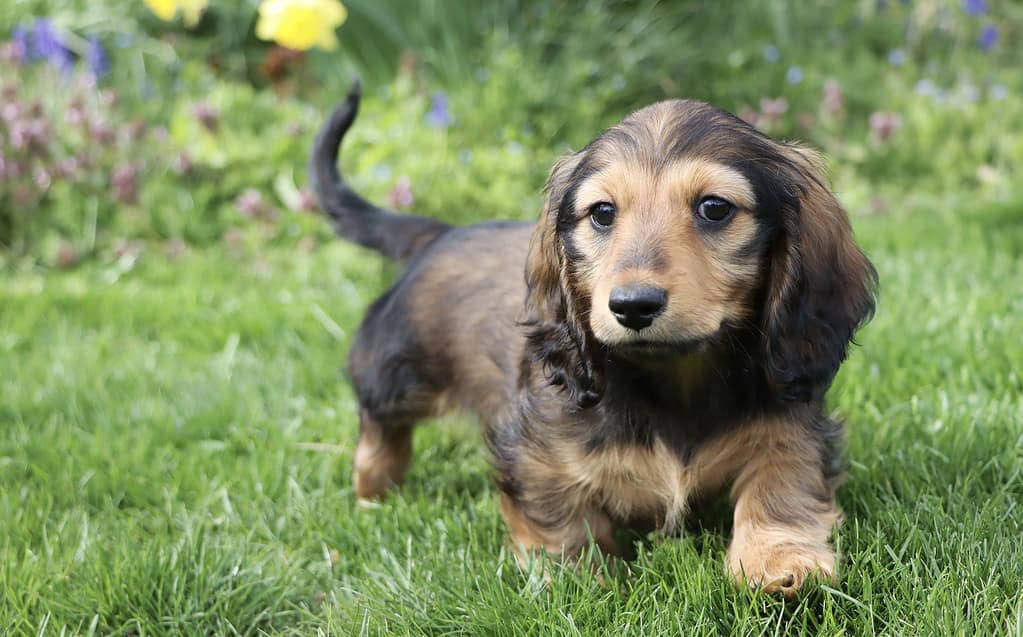
Dachshunds stand no more than 9 inches tall.
©Sherri Simms/iStock via Getty Images
There are two dachshund types. Standards weigh 16-32 pounds and stand 8-9 inches at the shoulder. Miniature Doxies weigh less than 11 pounds and are just 5-6 inches tall.
Dachshunds cost less to feed than larger dogs and can easily cuddle in your lap. However, there are downsides to their tiny size.
They’re easy to trip over, and you can hurt them badly if you step on them. They’re much more delicate than larger, sturdier breeds.
Dachshunds can also hide easily due to their short legs. Their love of burrowing can get them into trouble if they decide to climb beneath furniture or other places you don’t want them to be!
It can also be more difficult for them to keep up with you, so don’t expect to make them your jogging companions!
#2: They Have Delicate Spines
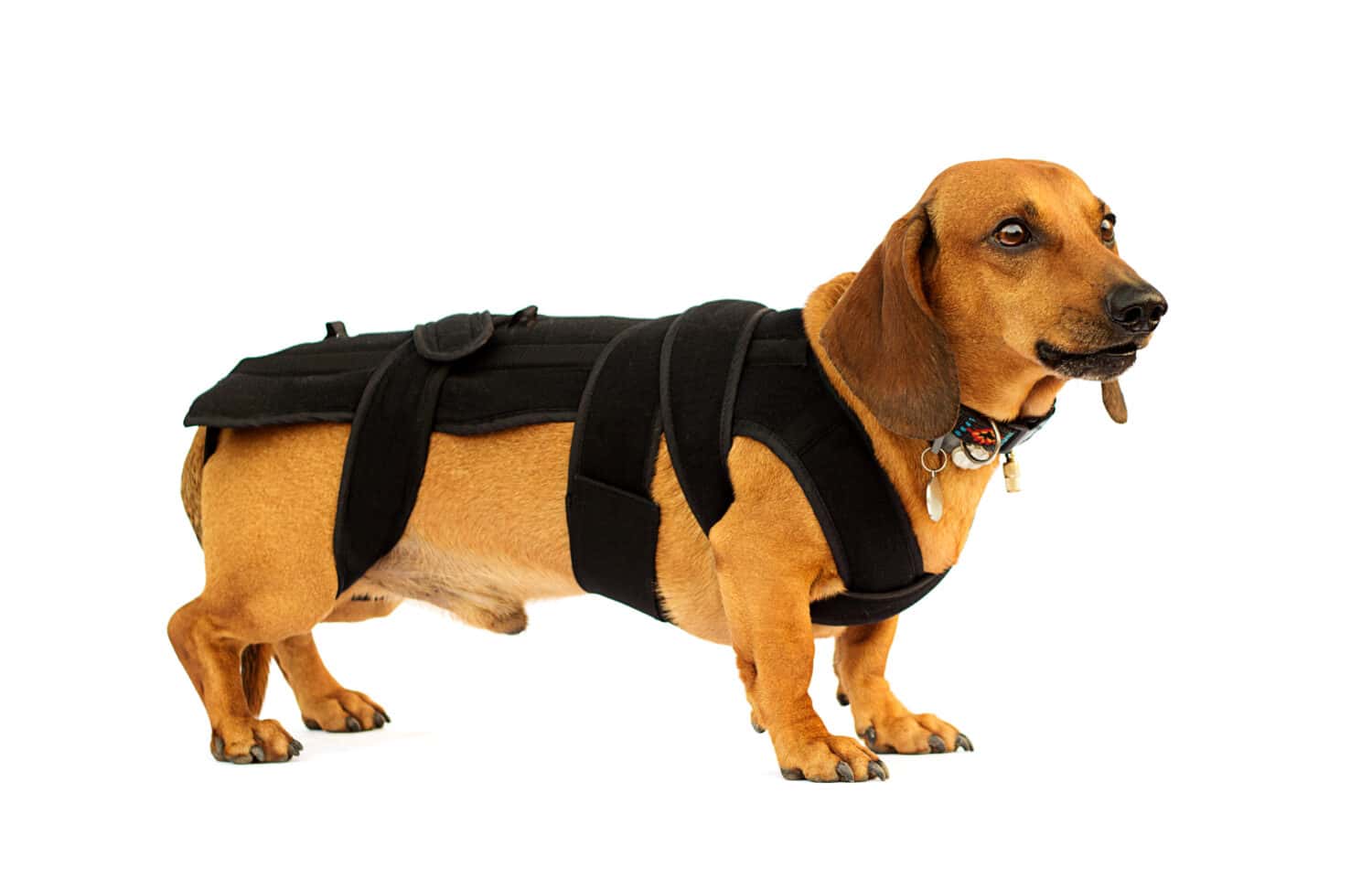
Spinal injuries are common in Dachshunds.
©Happy monkey/Shutterstock.com
Dachshunds are not bred to have proportional bodies. They’re longer than they are tall, which greatly increases their risk of spinal injuries. They’re also prone to intervertebral disc disease, also known as IVDD.
A top complaint about dachshunds is you must handle them carefully. You shouldn’t permit them to climb stairs or jump from furniture. To make things more difficult, your doxie will want to jump like any other dog–they don’t know it’s bad for them!
Placing doggy ramps near furniture will help your pup climb up without injury. If you have stairs in your home, be prepared to carry them up and down.
Spinal injuries can be expensive, as often surgery is required to repair the damage. In addition, they’re painful for your dog and scary for your human family to experience. Spinal injuries in dogs can lead to paralysis and even death.
#3: They’re Hyper
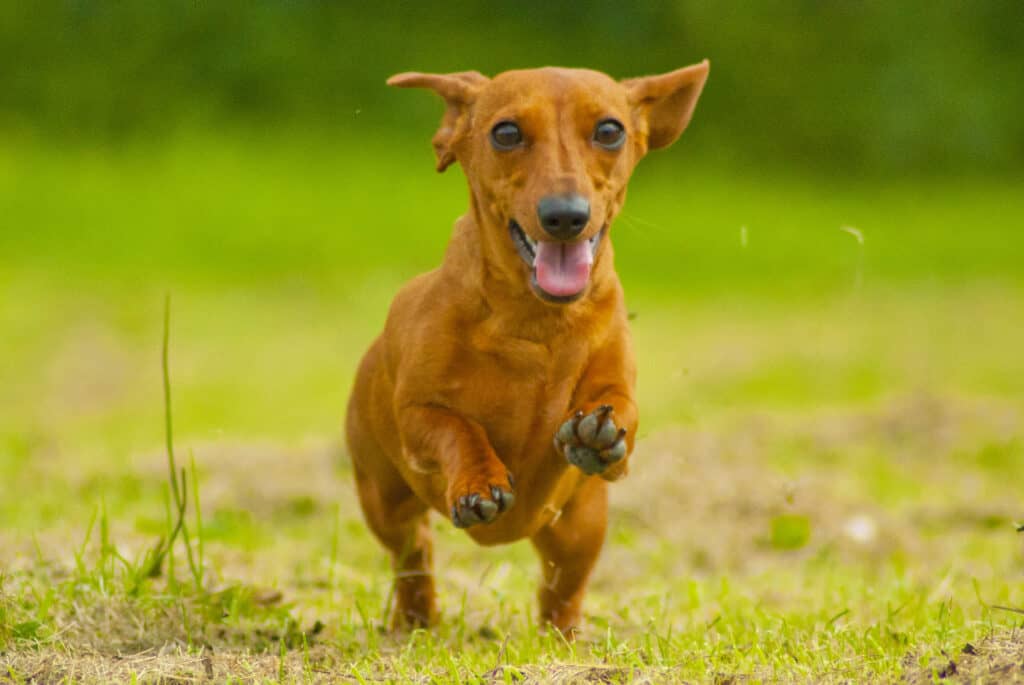
Dachshunds love to play and need plenty of daily activity.
©iStock.com/NORRIE3699
If you’re used to lap dogs, dachshunds may seem very hyper! These pups don’t like to sit around all day but are playful and need daily exercise.
Dachshunds were bred to hunt, not solely as companions. They thrive when given physical activity and mental enrichment.
#4: They Need Daily Exercise
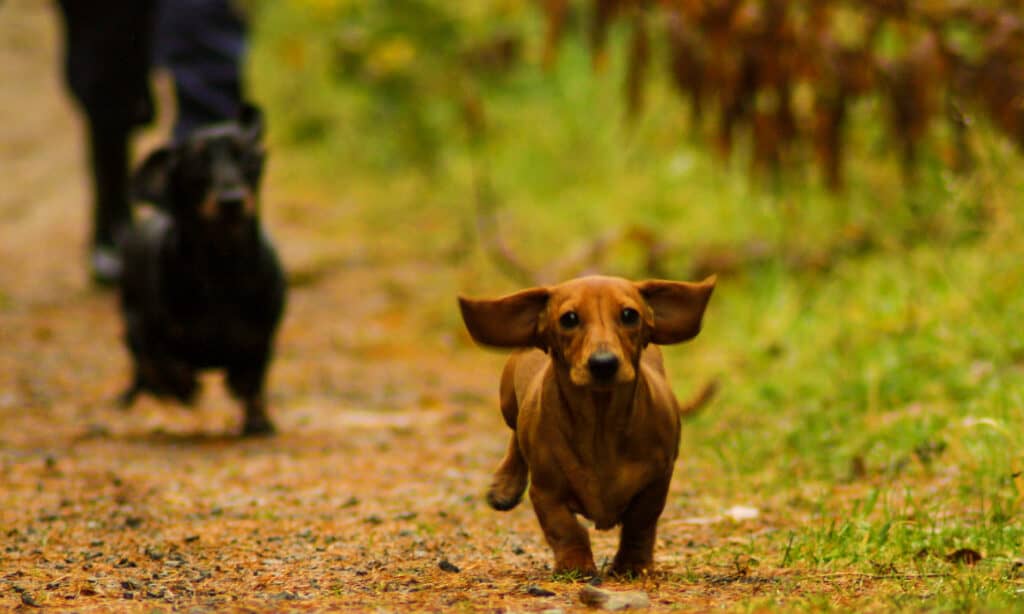
Doxies require more exercise than other small breeds.
©iStock.com/NORRIE3699
Dachshunds need to get out and stretch their legs through daily walks or other activities. According to the American Kennel Club, one short walk won’t be enough for them–they should have at least two of moderate length.
This activity level is the perfect fit for some people, but it’s more than others expect from a tiny breed. Make sure you can give your doxie enough exercise before adopting them.
#5: They Can be Destructive

Doxies love to chew!
©Carolyn Dietrich/Shutterstock.com
Like all dogs, dachshunds can chew–especially as puppies. They might tear up your favorite things if you leave them within reach.
It’s important to dog-proof your house before you bring your dachshund home. Remove any electrical cords, toxic houseplants, and treasured items from their reach.
Giving your dachshund enough exercise and mental enrichment can help prevent boredom and anxiety, which are two leading causes of destructive chewing.
#6: Dachshunds Love to Dig

They need outlets for their digging instincts or they may leave holes in the backyard.
©Masarik/Shutterstock.com
Chewing isn’t the only destructive habit for doxies. Another common complaint is dachshunds’ love of digging! This is because they were bred to hunt badgers by climbing into their burrows–hence, the short legs to allow them to fit inside.
Your dachshund retains these instincts and will likely dig in the backyard. They might even dig at their bedding or yours!
Instead of trying to prevent your pup from digging, encourage this natural behavior but redirect it to an appropriate outlet, such as a dig box in the backyard. You can also hide treats in boxes indoors or give your doxie blankets to burrow.
#7: They have Strong Prey Drives

They like to chase and aren’t always good with cats.
©Ermolaev Alexander/Shutterstock.com
Your doxie may chase pets or wildlife due to their strong prey drive. This can be annoying for dog guardians to deal with, but it’s all part of adopting a hunting breed.
Not all dachshunds will do well with cats. For best results, adopt a rescue pup raised with kitties from a young age and closely supervise your pets’ interactions.
Never allow your dog to chase your cats. You may need to keep them on a leash until they learn how to behave, especially when the cats are running.
#8: They Can be Loud
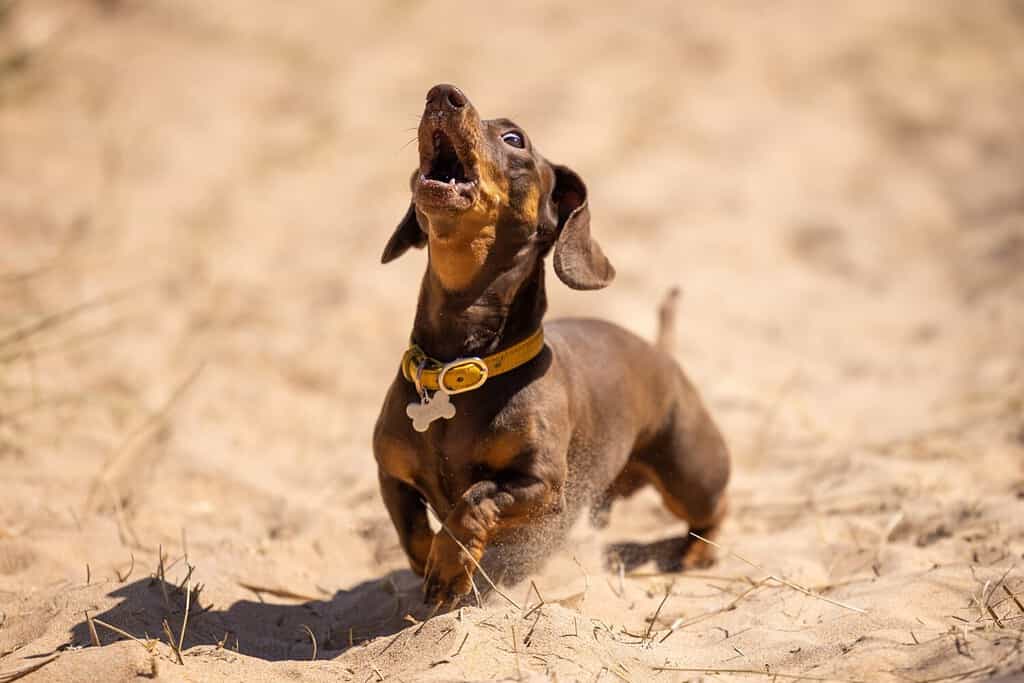
They can be yappy little dogs!
©David Pecheux/Shutterstock.com
Dachshunds bark a lot! They make terrific watchdogs and think they’re fierce enough to be a guarding breed–though not many people are going to fear a dog that weighs less than 32 pounds.
Teaching a “quiet” cue can go a long way toward living a peaceful life with your dachshund.
#9: They’re Stubborn

Dachshunds are smart, but may prove challenging to train.
©iStock.com/Ирина Мещерякова
Patience is key when training a dachshund because they can be very stubborn dogs. They have independent streaks and can be sassy as well!
Always stick to positive reinforcement or force-free training styles. Aversives are unnecessary and will only harm your relationship with your pup.
Keep training sessions short and fun, using treats and praise. You can even turn it into a game and add toys into the mix as rewards!
#10: Many Dachshunds are Wary of Strangers
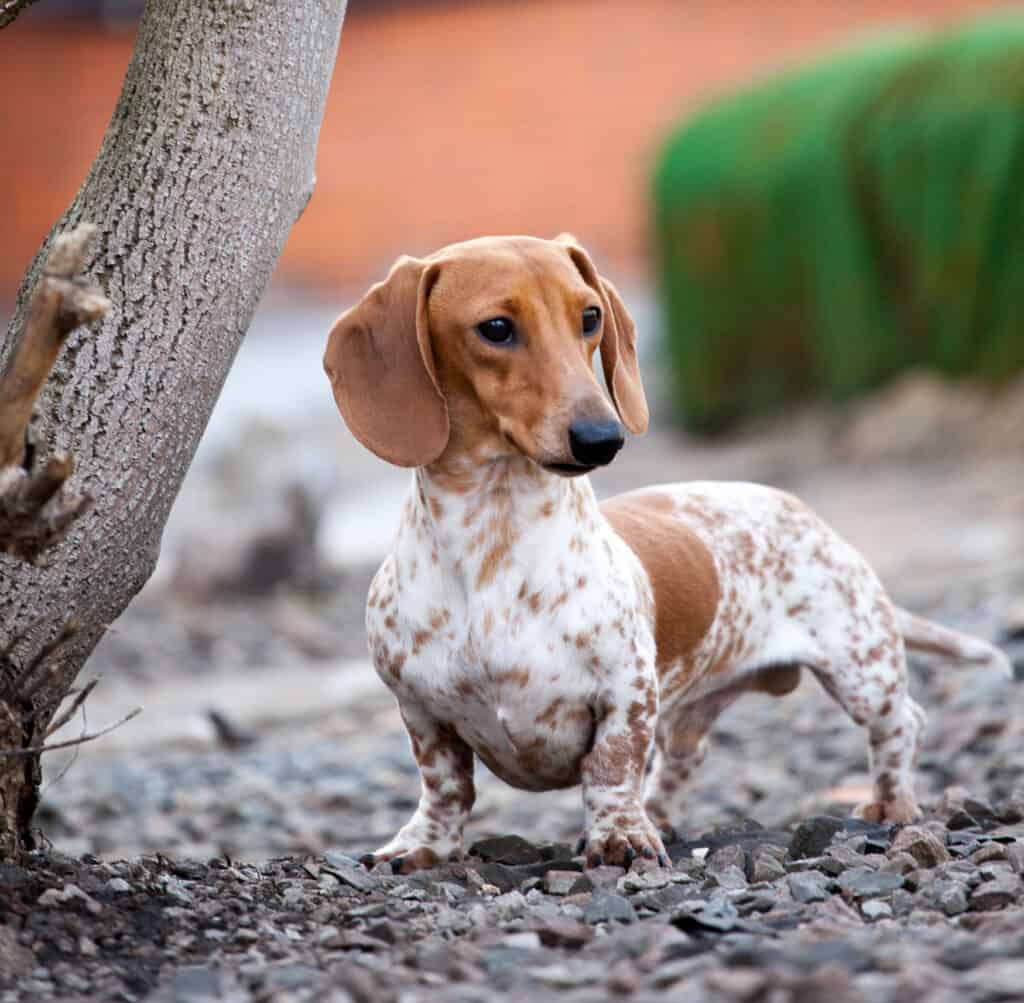
They might assign themselves the role of “guard dog.”
©iStock.com/Gorlov
As we touched on above, doxies tend to think they’re little guard dogs. They’re brave and prone to go into defense mode when it’s unnecessary.
It’s important to socialize them from an early age so that they don’t learn to fear strangers, and so that they learn not to be aggressive out in public.
#11: But, They’re Clingy with Family

They require a lot of attention every day.
©Taisa/Shutterstock.com
Despite often keeping their distance from strangers, Doxies are clingy to the people they know best. This breed may not be for you if you don’t want a cuddly dog.
They require a lot of time because they shouldn’t be left alone for long periods. For this reason, they often do better in families than with single people who work full-time outside of the home.
#12: They’re Prone to Separation Anxiety

Many Doxies get anxious when left alone and need constant companionship.
©Luiza Kleina/Shutterstock.com
Clingy dogs tend to be more prone to separation anxiety than those who are more independent. Dachshunds often develop separation anxiety, which makes them terrified of being alone.
Separation anxiety can cause problem behaviors like excessive barking, destructive chewing, and more.
But, being left alone for long periods and never being left alone both increase your dog’s chances of separation anxiety.
Teaching them to be alone by slowly accustoming them to you leaving the room while they’re occupied, then leaving home for short periods, can help. Start with what they’re comfortable with, even if it’s only minutes or seconds, and slowly work up from there.
#13: Potty Training is Challenging
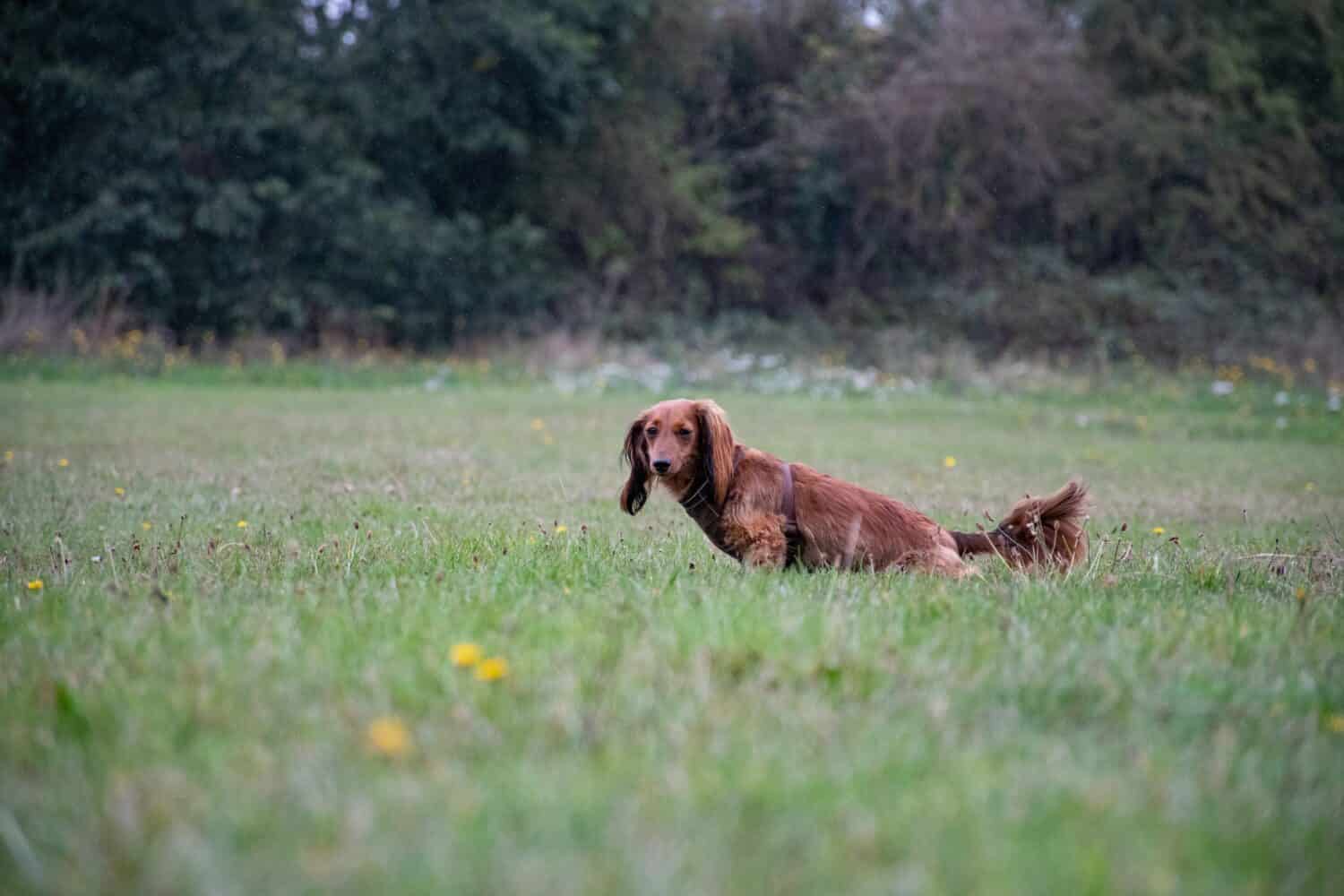
Patience is required when you potty train a dachshund.
©jack perks/Shutterstock.com
It’s common to struggle potty training dachshunds. In general, smaller dogs often take longer to potty train since they have smaller bladders, and may not be able to hold it as long as larger pups.
Consistency is key. Bring your dachshund outside for frequent potty trips, monitor them closely indoors for signs they need to go, and never punish them for having accidents!
#14: They Sniff too Much on Walks
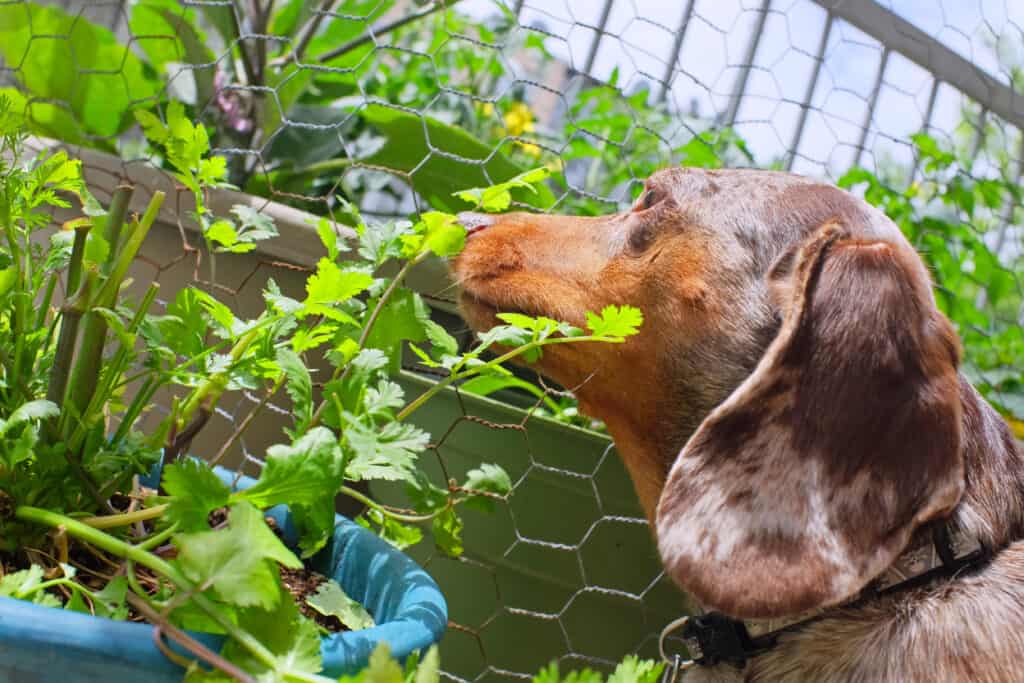
Your dachshund might want to sniff everything on their walks.
©a katz/Shutterstock.com
Dachshunds are scent hounds, which means they love nothing more than following a scent. Many people complain that their dachshund sniffs too much, which makes walks slow and boring.
It’s important to remember that walks offer enrichment for your pup and are not for your entertainment or exercise. Take things at their pace when possible and give them lots of sniff walks.
When you need to get somewhere faster, you can train your doxie to speed up a bit by using treats to lure them forward.
#15: They Shed
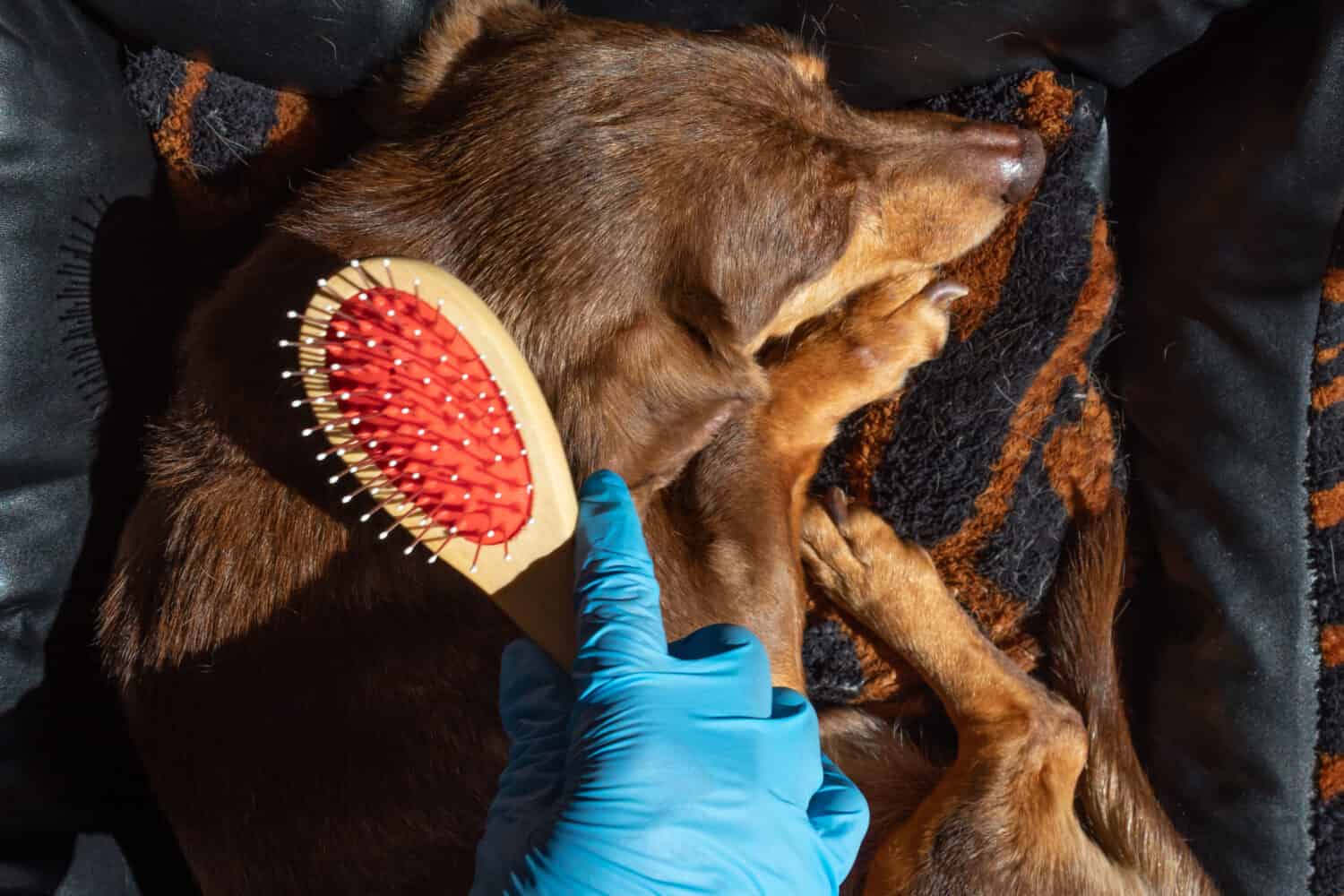
Dachshunds aren’t a non-shedding breed.
©neme_jimenez/Shutterstock.com
Dachshunds don’t shed a lot, but they do shed. This is a dealbreaker for some people, who may prefer non-shedding breeds like Malteses or poodles. (These breeds shed around the same as a human.)
That said, an occasional vacuum will pick up your dachshund’s hair without a problem. It shouldn’t add much to your normal cleaning routine.
#16: They Can be Difficult to Groom
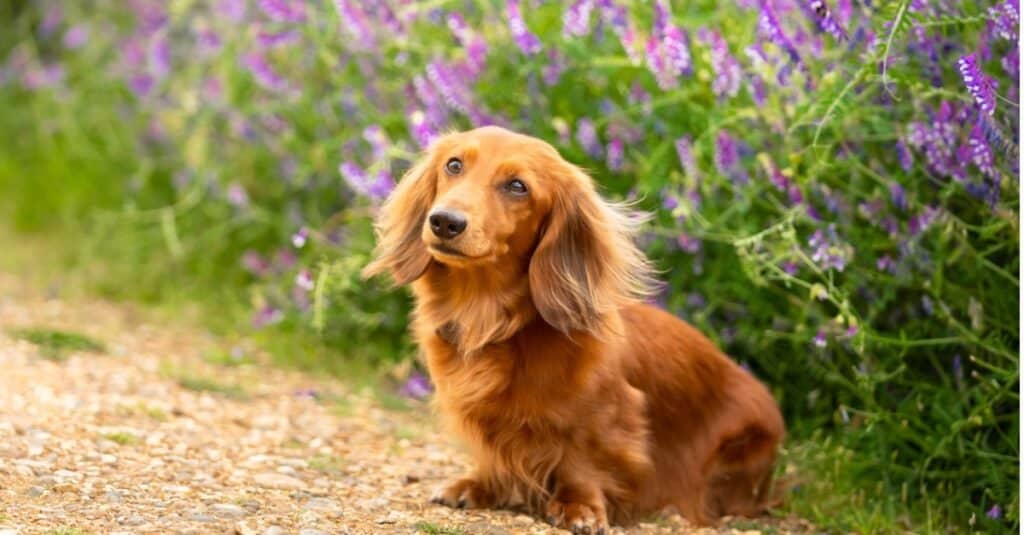
Longhaired and wire-haired dachshunds need frequent grooming.
©iStock.com/romitasromala
Shorthaired, or smooth, doxies are very easy to groom. They just require an occasional brushing and bath. However, longhairs and wirehairs can be more time-consuming.
Longhaired doxies may need to be brushed as often as daily or every few days, depending on their coat. Thicker coats need more frequent brushing to avoid painful mats from developing in the fur.
Wire-haired dachshunds have unique coats that require hand-stripping a few times a year and brushing a couple of times a week.
Your longhaired or wire-haired dachshund may also need haircuts done at home or by a professional. Of course, going to the groomer is an ongoing expense that you must budget for, which is another con to owning these dogs.
#17: They Might Not do Well with Children

Some doxies learn to fear children due to their delicate nature and are easily hurt by grabby hands.
©Hannamariah/Shutterstock.com
Dachshunds can do well with children if they’re treated well and their boundaries are respected. An adult should always be supervising the two to ensure no one is hurt.
Remember that doxies have sensitive spines. Children shouldn’t be able to pick up your dog, run around near them (in case they trip over the dog), or roughhouse. They should be taught dog body language and to stay away from the dog’s face and food.
Because they’re so easily hurt by kids, dachshunds may bite in retaliation. It’s ultimately an adult’s responsibility to ensure this doesn’t happen by teaching the child and dog how to interact gently.
#18: Extra Weight is Very Noticeable
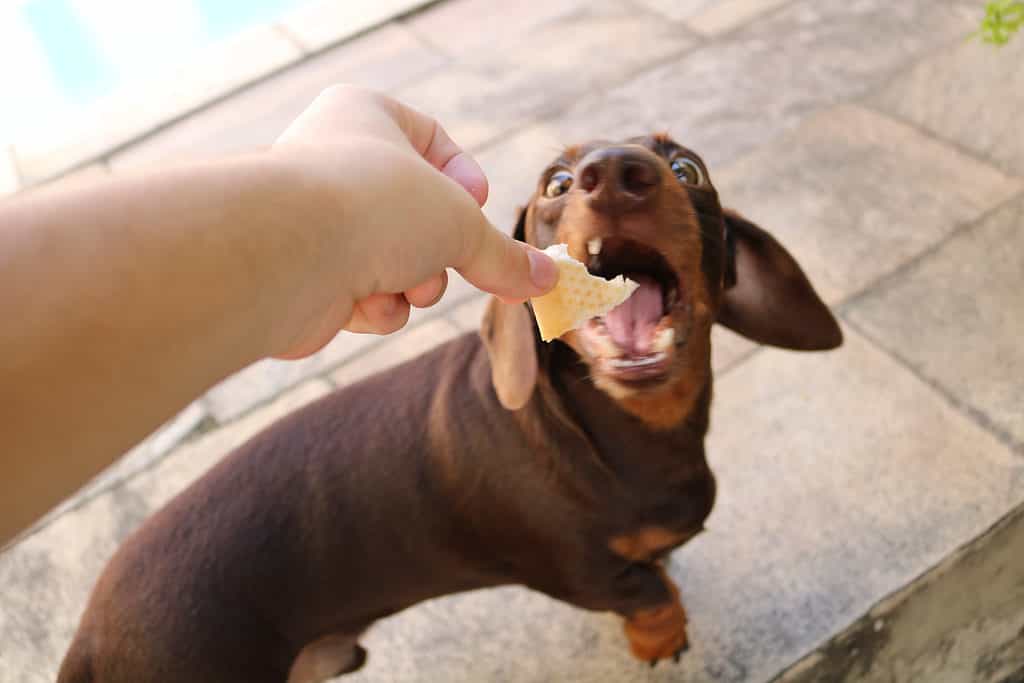
Doxies’ treats should be limited so that they stay at a healthy weight.
©Kaczleo/Shutterstock.com
If your Dachshund is overweight, it will be very noticeable–not only in their appearance but their health. Extra weight on the back and legs isn’t ideal for these pups.
In addition, overweight dogs tend to live shorter lives and suffer from more health problems than dogs who are fed an appropriate diet.
When you adopt your Doxie, ask your veterinarian how much they recommend feeding them and how much they should weigh. Continue to check in at your yearly check-ups to ensure they’re at a good weight.
#19: Dental Problems are Common in the Breed
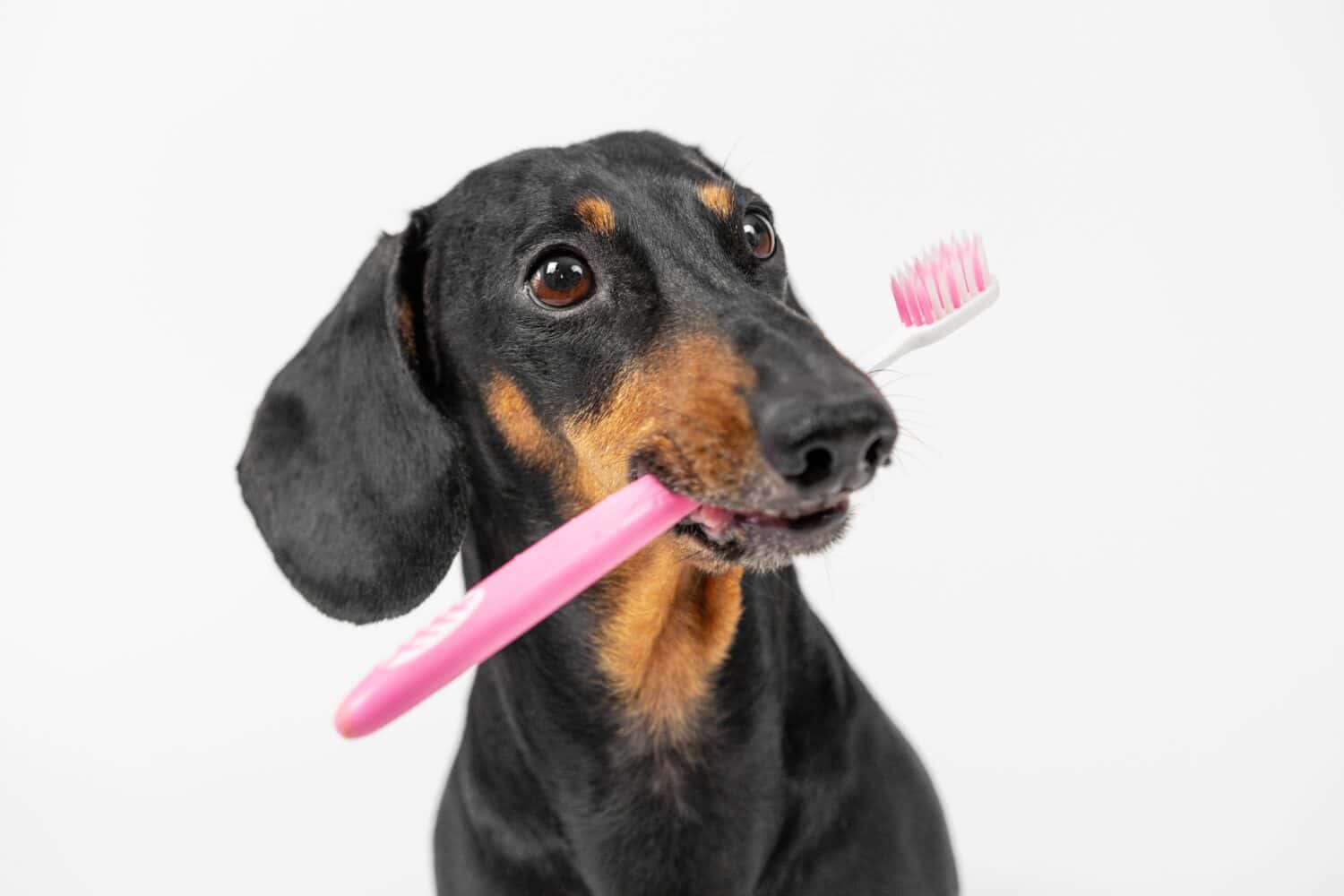
Doxies need their teeth brushed regularly.
©Masarik/Shutterstock.com
Dachshunds and other small breeds often suffer from dental problems due to their smaller mouths with the same number of teeth as large dogs. It’s, therefore, even more crucial to stay on top of their dental health.
Brushing your doxie’s teeth once every day or two will help prevent plaque build-up. You can also use dental chews and other dental hygiene items. Those approved by the Veterinary Oral Health Council have been proven to work effectively and are, therefore, the most highly recommended.
Your dachshund might also need professional dental cleanings or dental work done. Your veterinarian can advise you whether this is needed during your yearly check-ups.
The need for dental work is a common dachshund complaint since it’s so expensive!
Overall, many dog guardians find that their complaints don’t outweigh the love they have for their Dachshunds! But, it’s important to know the faults of the breed before adoption.
Doxies can be stubborn, destructive, and yappy. They’re also charismatic, sweet, and make good walking buddies. Whether they’re the right fit for you will depend on your lifestyle and what you want from your new fur baby.
Thank you for reading! If you have feedback on this post, please contact the AZ Animals editorial team.
The photo featured at the top of this post is © Sherri Simms/iStock via Getty Images
Ready to discover the top 10 cutest dog breeds in the entire world?
How about the fastest dogs, the largest dogs and those that are -- quite frankly -- just the kindest dogs on the planet? Each day, AZ Animals sends out lists just like this to our thousands of email subscribers. And the best part? It's FREE. Join today by entering your email below.
Thank you for reading! Have some feedback for us? Contact the AZ Animals editorial team.







